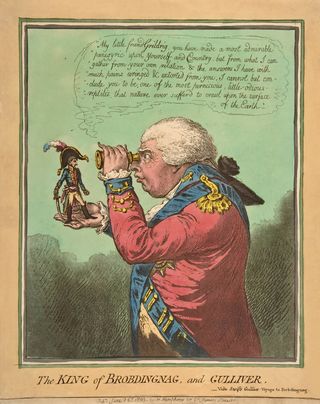Autism
Gulliver’s Travels: Another Classic Portrayal of Autism
Swift’s satire sees society from an autistic’s perspective.
Posted July 28, 2017

In a previous post, I argued that Daniel Defoe’s classic novel, Robinson Crusoe, is essentially an elaborated autistic fantasy of isolation, and one whose long-lasting appeal is to the autistic in all of us. And although there is no reason to think that Daniel Defoe was in any way autistic himself, I also pointed out that there is every reason to think that the real-life prototype of Robinson Crusoe indeed was.
Now, after re-reading Gulliver’s Travels (following my post on Sándor Szathmári’s Voyage to Kazohinia), I note that in the case of the author of this classic work, Jonathan Swift, we have good grounds for suspecting autism. In his book, The Genesis of Artistic Creativity, Michael Fitzgerald writes:
Swift meets four of the six Gillberg (1991) criteria for Asperger’s syndrome, but there is uncertainty about speech and language problems and no information on motor problems. Nevertheless, he does meet the DSM-IV criteria, which do not require any clinically significant delay in language development or motor problems.
Fitzgerald also comments that “Persons with Asperger’s syndrome often have an idiosyncratic perspective on the world that readers find very novel and illuminating, as it is different from that of neurotypicals.” Indeed, this is why autistic people often feel happier abroad than at home: A foreign country always offers a different perspective, and visitors to it cannot be expected to conform to social conventions and standard behaviour as strictly as natives can.

And this essentially is what we find in Gulliver’s Travels: different perspectives on the human race as seen by a visitor from a foreign country. In the first two parts, Gulliver’s adventures in Lilliput and Brobdingnag, the changed perspective is that of scale: In Lilliput, Gulliver is 12 times larger than the natives, and in Brobdingnag, 12 times smaller. In both places, though, like the typical autistic, he is out of place—he is literally not able to fit in. A vacant temple has to be found to house him in Lilliput, and a special box is manufactured as his home and means of transport in Brobdingnag.
But Gulliver’s behaviour makes him even more of a misfit. Although he saves the palace in Lilliput from burning down, the means he uses—his personal supply of hosed water—causes great offense to the queen; and he has to flee to escape being blinded in punishment for this and for failing to assist the king in his planned attack on the neighbouring kingdom. Clearly, Gulliver does not "fit in" in more ways than one, and in his practical but independent-minded behaviour quickly alienates what he sees as the moral midgets of Lilliput with their petty social obsessions and absurd political conflicts over which end of a boiled egg to open.
In Brobdingnag, Gulliver’s perspective on the giants around him gives him a microscopic view of their course skins, lice, and other imperfections visible only to him, producing a revulsion that confirms his autistic isolation. Conversely, the words he puts into the King of Brobdingnag’s mouth describe Gulliver’s countrymen as “the most pernicious Race of little odious Vermin that Nature ever suffered to crawl upon the Surface of the Earth.”
Much the same might describe the Yahoos, with whom Gulliver is himself classified by the noble, equine Houyhnhnms in a biological reversal of perspective. Horses, the domesticated animals at home, become the ruling elite, and the human-like Yahoos, their slave animals. Gulliver, even when he returns home to the bosom of his family, is struck with “the utmost Shame, Confusion, and Horror” to find that “by copulating with one of the Yahoo Species I had become a Parent of more…”
No wonder that, just like Robinson Crusoe, Gulliver’s “Design” on being exiled by the Houyhnhnms...
...was, if possible, to discover some small Island uninhabited, yet sufficient by my Labour to furnish me with the Necessities of Life, which I would have thought a greater Happiness than to be the first Minister in the Politest Court of Europe; so horrible was the Idea I conceived of returning to live in the Society and under the Government of Yahoos.
Michael Fitzgerald argues that autistic artists and authors are troubled by "identity diffusion" and have to struggle to define themselves, often via their works. Swift’s use of 41 different pseudonyms—a record in English literature—certainly might be seen to confirm his view.
Another way of looking at it is that the problem is not so much this autistic author’s as that of the society in which he found himself. Swift was deeply involved with the politics of his time and played a decisive role in leading the outcry that defeated the British government’s attempt to foist a debased coinage on the Irish (Wood’s halfpenny), something a recent biography of Swift described as “arguably the first time in British history that a purely popular campaign of protest reversed a political decision of central government.” The same account adds that “In so many self-representations in letters and poems, Swift had depicted himself as a man apart, a victim of circumstances, an exile, an outcast, ‘disqualified by fate’—an unfortunate whom no one in their senses would ever try to imitate.”
The same author is somewhat dismissive of Fitzgerald’s diagnosis, but goes on unknowingly to provide much further material to corroborate it. Perhaps the most remarkable from the point of view of the diametric model of autism is the unexpected mechanistic skill—not to mention personal courage—that Swift revealed when he, “the government’s principal rhetorician… acted as a bomb-disposal man… With an astonishingly cool head and steady hand, Swift set about inching the... explosives” contained in inkhorns out of a booby-trapped parcel bomb improvised out of a pistol which had been sent to one of his patrons and political allies, Robert Harley (1661-1724), later First Earl of Oxford.
The device played devilishly on a natural instinct to remove the pistol first, in effect the detonator. Doing so, however, would disturb the nails supporting it in such a way that a secondary connection would have fired the gun, immediately igniting the inkhorns. These would have discharged their powder and shot through both sides of the box—blasting whoever was holding the package and anyone standing beside or nearby.
Swift himself concluded, “I have done: for those who have used Power to cramp Liberty have gone so far as to resent even the Liberty of Complaining...” But his complaints sound like those of an autistic when he confesses that
I have ever hated all nations, professions, and communities and all my love is towards individuals; for instance, I hate the tribe of lawyers, but I love Counsellor such a one, Judge such a one, and so physicians (I will not speak of my own trade) soldiers, English, Scotch, French, and the rest; but principally I hate and detest that animal called man although I heartily love John, Peter, and Thomas and so forth.
He adds that "Upon this great foundation of misanthropy (...) the whole building of my travels is erected," but to psychology today this misanthropy looks more like autistic alienation from what Defoe called "the general Plague of Mankind," and what I would term mentalism, as I argued in an earlier post.
By savagely satirizing the society which he found so alienating in a book which has been described as “often as rude and as adversarial as any modern product of political activism,” Swift, like Defoe before him, has given us one of the greatest classics of English literature and, again like Defoe, a masterful reflection of the autistic experience. But what his satire also does is to liberate language itself from the censorship which, now as then, society tries to impose on those who search not only for their true selves, but for Truth itself (as Swift would have written it).
Perhaps no one in their right senses would ever try to imitate Swift. But the right sense in which to imitate Gulliver's Travels (exactly what Szathmári did so brilliantly) is a quite different matter.
References
Stubbs, J. (2016). Jonathan Swift: The Reluctant Rebel. UK: Viking.




